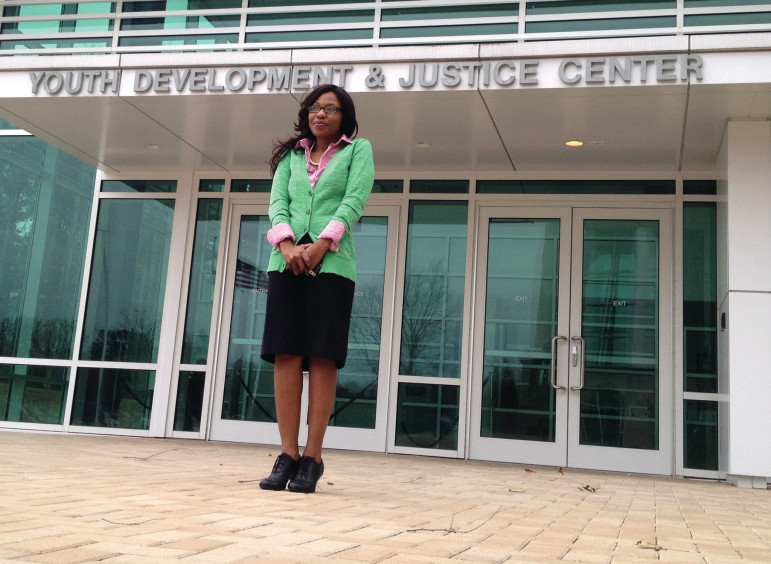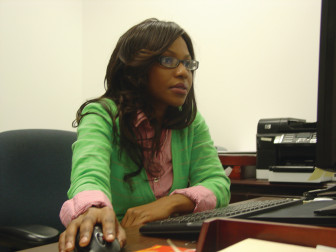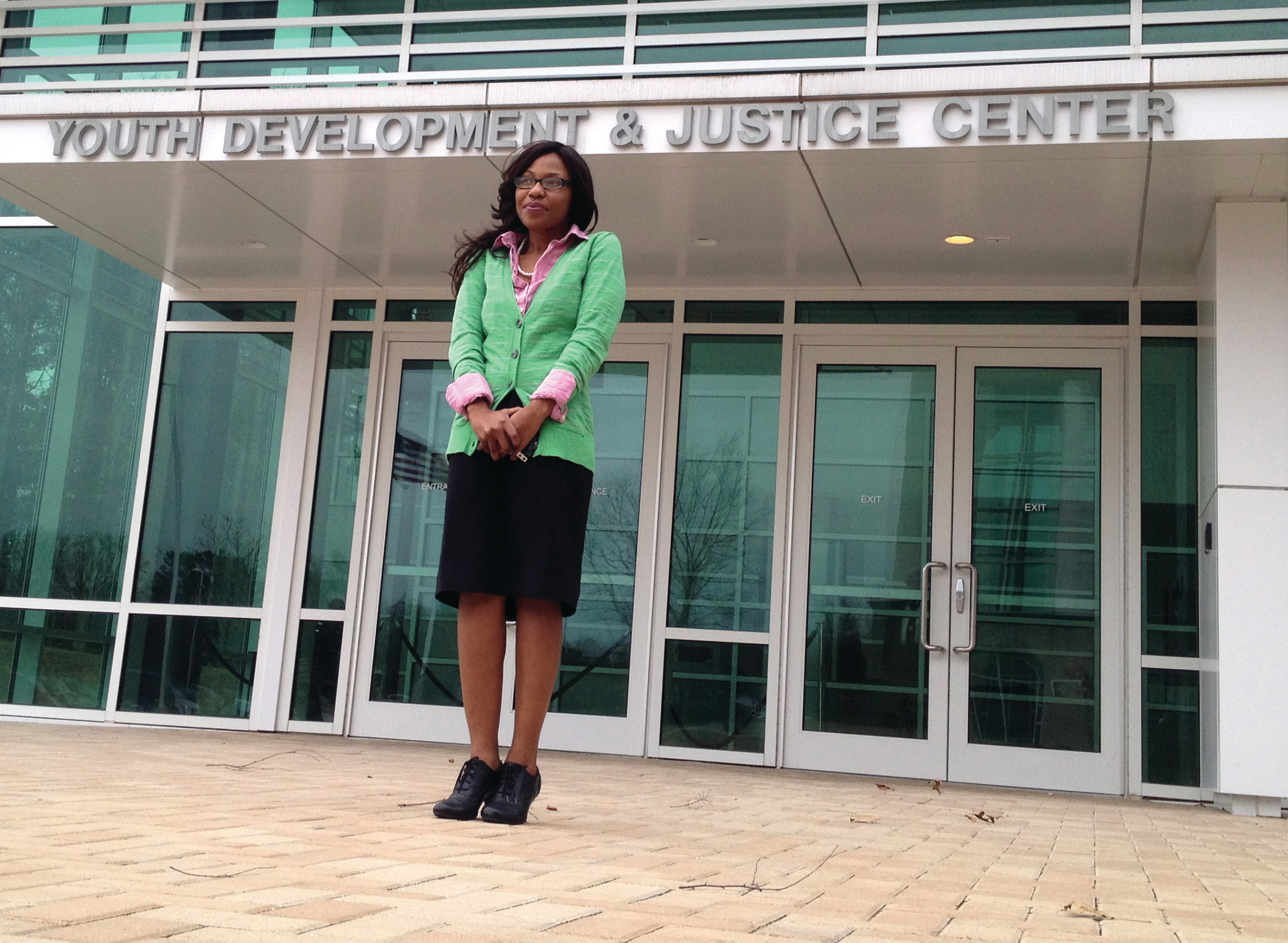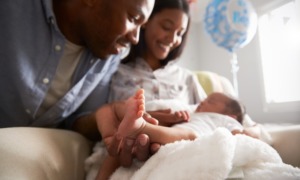
Photo by Elly W. Yu
Julie Kisaka, 29, is an extern at Clayton County Juvenile Court in Georgia. Fifteen years ago, she stood in front of a judge herself. Yu
JONESBORO, Ga. — Of all the birthdays Julie Kisaka remembers from her childhood, one clearly stands out among the rest.
“There’s nothing worse than celebrating your 15th birthday in jail,” Kisaka said.
Kisaka, now 29, recalls being confined at a youth detention facility in Clayton County, Ga., for stealing her parents’ car. On her birthday, Kisaka’s parents brought her a chocolate cake, and the three of them sat quietly in the detention center’s small cafeteria. Behind bars, Kisaka tasted bitterness.
“I think that I was like ‘OK – I need to chill,’” Kisaka said.
She decided she never wanted to spend another birthday in detention. But today, Kisaka is back in the courtrooms where it all started 15 years ago, this time, as a law clerk for Steven Teske, chief judge of Clayton County Juvenile Court.
Kisaka is now finishing her last year of law school in Jacksonville, Fla., at Florida Coastal School of Law, where she has been specializing in corporate transaction law. Up until January, when she started working for the court, Kisaka had largely put her juvenile delinquent past behind her.
But as she sat in on juvenile court hearings and saw a young offenders sitting in front of a judge who could forever change their futures, she said she couldn’t help but relate. And her ambitions have now changed.
“I have a soft spot for this type of law and this practice,” Kisaka said.
Kisaka, who immigrated with her parents from Kenya when she was 4 years old, is petite and soft-spoken. But when it comes to juvenile-justice law, her passion speaks loudly.
“I think the only negative thing [that came from my experience] is how I ended up feeling how a lot of youth are being treated,” she said.
A juvenile record
Fifteen years ago, Kisaka stood in front of a judge, wearing a light brown jumpsuit with handcuffs on her arms and shackles around her ankles.
Days earlier, she had taken her dad’s car while her parents were out, and, not knowing how to drive, immediately crashed it into the side of their apartment building. When her parents came back, they had to call the police to file a report for their insurance claim.
“When they asked what happened, we had to tell them the truth. From there, then she got a record,” said Kisaka’s father, Donald Mwawasi.
Kisaka, who had been on probation due to missing school, was now facing greater punishment.
In court, Kisaka felt defiant and confident. “All I heard was 30 days to disposition, and I think I’m going home,” Kisaka recalled.
But she had misheard. The judge called for 30 days in detention before her disposition hearing. She was put back in her holding cell. Up until that point, she had felt invincible.
“I cried. You’re scared and you’re 14,” she remembered. “I relatively wasn’t, I don’t think, a bad kid.”
Her parents were the only adults with her at the time of the hearing. They didn’t have any legal representation at the time, a condition now required in Georgia.
Her father said he never expected the court to send her to a youth facility. “They said it was just detention and not a prison,” Mwawasi recalled.
“They said that’s the best way for her to learn.” But he said not having his daughter in his home was stressful. He didn’t know how she was being treated, what she was being fed. “You’d wish that nothing of that kind would happen, as a parent.”
A new beginning
After 30 days in detention, Kisaka never looked back. She was charged at her disposition hearing with theft by taking, but was released and put on probation. She had made it a goal to catch up on her schoolwork in detention, so she wasn’t so far behind when she got back to school for her sophomore year.
“I reverted back to my old self and that was it,” she said. Though she rebelliously skipped school during ninth grade, Kisaka had always wanted to be a lawyer — and with parents who both had advanced degrees, not going to college wasn’t an option, she said. She was able to raise her GPA from nearly zero to better than 3.0 by junior year, and went on to Clayton State University to study political science.
| “Too many kids who are caught up in the juvenile justice system are so far behind academically.”Sharon Hill • Georgia Appleseed Center for Law and Justice |
Up until this past year, Kisaka thought that it was detention that had changed her for the better — the wake-up call she needed.
“For the longest time, I always assumed that it was because I was locked up that I changed,” she said. But after working with Judge Teske and by looking at the juvenile justice system as an outsider, she’s come to realize she was wrong.
“I think [detention] does more harm than it does good,” Kisaka said.
Because the center was overcrowded, Kisaka slept on a mattress on the floor, and shared the cell made for two with two other girls.
She said she picked up tricks she would have never had before. “I learned how to be more of a criminal in juvenile,” she said.
When she thinks about the girls she met in juvenile, she can’t help but wonder what had happened to all of them. Some, she says, went on to state prison.
“I’m an anomaly because I had structure,” she said.
Before spending time in detention, Kisaka was involved in several extracurricular activities. She was part of her school’s dance team, step team and a thespian society.
“I had stuff to go back to and a support system for those things,” she said.
And Kisaka said her parents also had a lot to do with her rehabilitation.
“I was in a much better position than most kids who were locked up,” she said.
Judge Teske, who has since helped form rehabilitation programs in Clayton County, agrees that Kisaka’s nurturing environment made a difference.
“Julie had that to draw from. Her friends didn’t,” Teske said. “She was one of the lucky ones.”
A wrap-around approach
Sharon Hill, executive director of the Georgia Appleseed Center for Law and Justice, who helped to pass Georgia’s sweeping juvenile-justice reform bill last year, said Kisaka’s story is too unique.
“She had some hope for the future through education, and she had some capacity to make that hope a reality,” Hill said. “Too many kids who are caught up in the juvenile-justice system are so far behind academically.”
While Kisaka knew she wanted to back to school and attend college, not many other adjudicated teens are equipped to do so. More than two-thirds of youth who are released from formal custody don’t return to school, according to a 2009 report by the Sentencing Project.
Michelle Newell, a senior policy associate at the Children’s Defense Fund, said the vast majority of young people in the juvenile-justice system have experienced trauma, have learning disabilities and mental health needs, making them most vulnerable.
“In re-entry, you really need a wraparound approach,” Newell said. A partnership with families, caseworkers and other service providers is important to rehabilitation and to help the child as a whole.
“The stronger relationships with a teacher or a counselor or a community-based organizer, the more successful they will be back home,” Newell said.
Education is also critical, so programs should ensure education as part of a reentry plan, Newell said. In Missouri, the juvenile-justice system helps to re-enroll youth before they are even released, so the young people don’t have to navigate the system on their own.
“It’s really about building up their self-confidence and providing hope and a sense of what their path can be,” Newell said.
An advocate for reform
This past March, Kisaka traveled to Washington D.C., with Teske to testify in a Senate briefing on the reauthorization of the Juvenile Justice and Delinquency Prevention Act, a law originally passed in 1974 that provides funds for states to improve their juvenile justice systems. The bill has been up for reauthorization since 2008.
Kisaka shared her experience through the juvenile court system and described how being detained for a non-violent offense can do more harm than good.
“It moved everyone in the audience,” Teske said.

Photo by Elly W. Yu
Julie Kisaka says that coming back to work in the county where she was detained as a teenager was the last thing she thought she’d do. Yu
Today, Kisaka talks about the need for reform, drawing from her own experiences, and has a running list of ideas in mind. “Programs that steer more on rehabilitation than detention and punishment,” she said. “You’re talking about services, counseling programs, diversion.”
She said that kids shouldn’t be detained for status offenses, and it’s important to look at the root cause of why a child is acting out – or else kids can often end up back in the system.
“Kids are angry — they’re mad about the life, mad about their situation — it’s more of cry for help than anything else,” Kisaka said.
“You can’t tell me that every single kid in this world is just a bad kid.”
Financial supporters of Youth Today may be quoted or mentioned in our stories. They may also be the subjects of our stories.
































